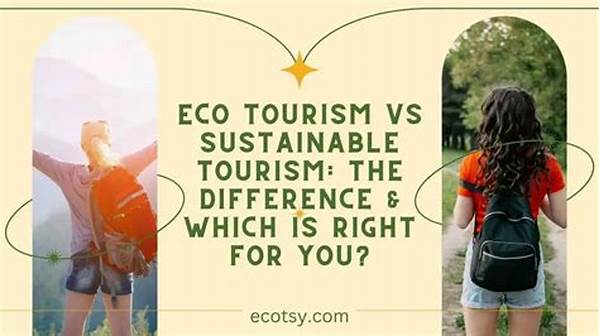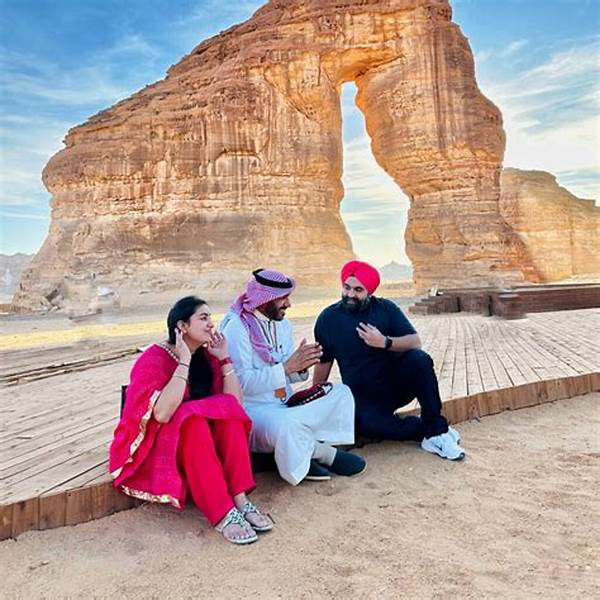Choosing between eco-tourism and traditional tourism is like deciding between two distinctly flavored ice creams on a hot summer day. Both serve the purpose of providing a refreshing and enjoyable escape, yet each offers a unique experience that caters to different tastes and preferences. As our world evolves, so do our travel desires. Eco-tourism and traditional tourism represent two paradigmatic approaches to how we interact with nature, culture, and commerce. Whether you’re a seasoned traveler or a novice explorer, understanding these two concepts is essential before picking your next vacation style.
Read More : Underrated Natural Destinations In South America
Eco-tourism has grown significantly over the past decades as environmental awareness and responsibility have moved to the forefront of global discourse. Often dubbed ‘responsible travel,’ eco-tourism focuses on experiences that conserve the environment, sustain the well-being of local people, and involve interpretation and education. Imagine hiking through the lush rainforests of Costa Rica while a guide educates you on biodiversity, or volunteering in a wildlife sanctuary in Thailand. Such experiences not only offer adventure and learning but contribute to the ecosystem’s sustainability. For the environmentally conscious traveler, this form of tourism promises a profound connection with nature and local communities, offering an impactful journey that resonates long after returning home.
In contrast, traditional tourism often emphasizes comfort, luxury, and relaxation, frequently focusing on the consumption of experiences and destinations. Think all-inclusive resorts in Mexico or cruises through the Caribbean where everything from meals to entertainment is at your fingertips. Traditional tourism thrives on the idea of escapism and indulgence. Its predictable itineraries and accommodations offer travelers a sense of comfort and security, knowing what to expect regardless of the destination. This form of tourism is ideal for those seeking a carefree experience, where rest and recreation take precedence over exploration and education.
Navigating the choice between eco-tourism vs traditional tourism: what to choose, therefore, becomes a question of values and priorities. Are you keen on reducing your carbon footprint, supporting local economies, and immersing yourself in different cultures and environments responsibly? Or do you lean towards relaxation, luxurious comforts, and a hassle-free holiday? The decision often shapes the quality and type of memories you forge in your travels, leaving a unique imprint on your life narrative.
Factors to Consider
When pondering over eco-tourism vs traditional tourism: what to choose, individuals must consider multiple factors. These include personal travel goals, environmental concerns, budget, and the overall experience sought. With eco-tourism, the opportunity to learn, empower local communities, and conserve nature often comes at a cost. Prices can be higher due to the sustainable practices involved. However, for many, the value derived from supporting a worthy cause transcends the monetary implications.
Conversely, traditional tourism tends to offer more competitive prices, courtesy of economies of scale and standardized services. Whether through packaged tours or resorts, tourists often find attractive deals ideal for families and groups. Yet, this often comes with a trade-off in unique, authentic experiences. While the abundance of facilities and activities can be dazzling, the environmental and cultural impact of such tourism can be profound, leading to over-commercialization and sometimes exploitation of resources.
The allure of both eco-tourism and traditional tourism cannot be undermined. Both have their distinct merits and challenges, and the choice often boils down to a personal statement of how one wishes to engage with the world. As you chart your adventure, consider this: each journey starts with a single step. Whether that step is on an emerald path through a rainforest or a sun-drenched poolside lounger, the choice reflects your evolving relationship with travel.
Making the Right Choice for You
Eco-tourism vs traditional tourism: what to choose comes down to aligning your travel with your values and expectations. Are you aspiring to be part of a transformative experience that gives back, or are you seeking to relax and recharge in a familiar environment? The debate may seem daunting, but it’s excellent news for choice lovers. From the breathtaking trails of the Himalayas to the majestic all-inclusiveness of a Cancun resort, variety ensures there’s always a new story to discover, regardless of your preference.
Now that you’ve been introduced to both experiences, it’s time for action. Pack your bags with intention, select your destination with consciousness, and embark on a trip that will either call you to advocate for the planet or allow you to enjoy its current splendor.
—
Understanding the Financial Impact
Climate change is no longer just a topic for scholars and activists; it’s something that directly influences our travel choices today. Eco-tourism is seen as a sustainable option that often translates to higher costs due to ethical practices. Yet, supporters argue that supporting local businesses and minimizing environmental impact justify the cost. In regions where eco-tourism flourishes, studies indicate positive economic impacts on local communities. Balancing growth with ecological conservation ensures resources remain available for future generations.
Traditional tourism, on the other hand, contributes heavily to the economy but can sometimes have adverse environmental effects. In highly-visited areas, traditional tourism can lead to infrastructure overload, resource depletion, and cultural dilution, with profit often leaving the host community. While it offers economical travel choices for vacationers through package deals and discounts, the broader economic impact on destination countries can be both positive and negative. It has been noted in reports that unmanaged tourism can lead to unsustainable development.
Understanding Societal Preferences
The Motivation Behind Travel Choices
Studies have shown there’s a growing shift in public preference toward more sustainable travel options. Millennials and Gen Z travelers, in particular, are motivated by experiences that prioritize purpose over pleasure. These generations prefer trips that offer educational components and opportunities to contribute positively to local communities. In contrast, older generations might still favor traditional tourism for its comfort and nostalgia.
Eco-tourism vs traditional tourism: what to choose remains a pivotal question as societal values transition. Traveling isn’t merely about seeing new sights; it’s a reflection of individual values and aspirations. For travelers passionate about sustainability, the choice is clear, but no choice is without its trade-offs. Balancing desire, cost, and impact is as crucial as choosing the right destination.
Key Objectives of Eco-Tourism vs Traditional Tourism
1. Minimizing Environmental Impact
Strive for sustainable practices that preserve natural habitats.
2. Supporting Local Economies
Boost local businesses and communities by encouraging cultural exchanges.
3. Enhancing Travel Experiences
Emphasize authentic cultural immersion over commercialized experiences.
4. Providing Educational Opportunities
Offer learning experiences about ecosystems, wildlife, and local traditions.
Read More : Affordable Travel Groups Exploring The Natural Fence Tourist Spot This Year
5. Ensuring Accessibility and Inclusivity
Make travel accessible to a wide variety of people regardless of budget or ability.
6. Promoting Safety and Comfort
Maintain safety standards while ensuring comfort and convenience in travels.
7. Balancing Cost and Value
Align travel costs with the value delivered to both the traveler and host community.
8. Adapting to New Technologies
Incorporate technology in tourism for enhanced experiences and sustainability.
9. Preserving Cultural Heritage
Protect and promote awareness of local traditions and histories.
The Balance Between Accessibility and Sustainability
The choice between eco-tourism and traditional tourism often hinges on accessibility and sustainability. Eco-tourism seeks to minimize footprints and prioritize conservation, but it can pose accessibility issues. Locations that are preserved may not always be easily reached, and the costs to ensure low impact can exclude budget-conscious travelers.
On the flip side, traditional tourism often excels in accessibility, aiming to appeal to a broader audience through ease of travel and competitive pricing. However, this approach may overlook the larger picture of sustainability. Thus, travelers face the challenge of determining which form best suits their needs without compromising their values.
The Future of Eco-Tourism and Traditional Tourism
As the world becomes more conscious of its ecological footprint, both eco-tourism and traditional tourism will adapt. This evolution is driven by changing consumer demands, government policies, and global agreements to tackle climate change and cultural preservation.
As travelers, you have the power to steer this trajectory. By choosing experiences that align with your values, you become ambassadors for these concepts. Whether treading softly in sacred forests or sipping cocktails at a beachfront bar, the future of travel is inclusive and diverse. You just need to decide: eco-tourism vs traditional tourism: what to choose? The world is vast, and the adventures awaiting you are myriad. Make your choice, take that step, and write your page in the travel history books.
Conclusion: Weighing the Choices
The decision of eco-tourism vs traditional tourism: what to choose can initially feel overwhelming, but it ultimately boils down to aligning travel purposes with personal values. As you plan your next journey, consider what aspects of a new place you hope to explore and contribute to, whether it’s through appreciating its natural beauty or partaking in its cultural heritage.
Both eco-tourism and traditional tourism have their merits and downsides, and the choice will reflect your evolving stance on travel. By understanding their differences, you can make informed choices that align with both your desires and responsibilities. So, what’s it going to be?
—
Short Tourist Perspectives
As you contemplate eco-tourism vs traditional tourism: what to choose, it’s vital to embrace the narratives each offers. Eco-tourism presents itself as the guardian angel of nature, calling to those who strive to leave no trace and support planetary health. On the other hand, traditional tourism lures with the promise of accessible luxury and predictable comfort, perfect for unwinding. Whether your heart calls for an eco-conscious trek or a sun-soaked resort, the beauty lies in the diversity each path presents. Make your journey one to remember by choosing the experience that resonates with your ideals and desires. Bon voyage!


